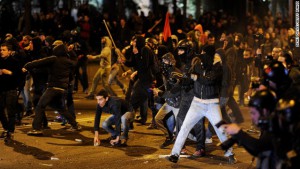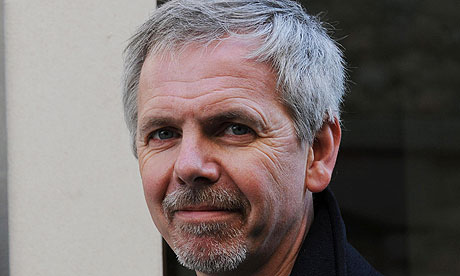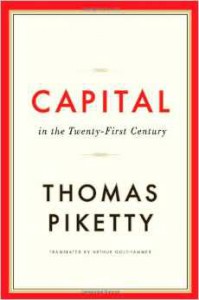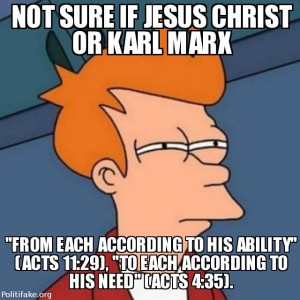I was present at the Brixton Recreation Center earlier tonight, where vote counting was going — and continues to go — on. Workers there are paid a standard rate that is independent of how long they spend counting votes, and this sets up obvious moral hazard dilemmas: the quicker and sloppier, the sooner they can cut the check and catch some Zzz’s. Not that this is the only problem with Britain’s monstrous electoral endeavors. As it has not switched to any form of electronic voting — belonging to a shrinking segment of the first world not to adopt some measure of technological progress in governing — the process is long-winded, tedious and drone-like: in short, it’s manual, as you can see from the short video below that was cut off by my cell phone battery dying:
Search SoC
-
Recent Posts
Recent Comments
- S. Duncan on On The Decline and Fall of The American Empire and Socialism
- FruitLupus on On The Decline and Fall of The American Empire and Socialism
- Edith on The Case of Comrade Dallas
- James O'Brien on Wailings about Left Unity
- James O'Brien on Wailings about Left Unity
Blogroll
- Cedar Lounge Revolution Heterogeneous Irish leftist blog
- Critical Proletariat Socialist journal on labour issues in Britain
- Freenode's web chat client We often chat on the Freenode IRC network. Come chat with us on the ##marxism channel.
- From Alpha 2 Omega Hosted by Tom O’Brien this podcast features in-depth interviews with leading figures in the fields of Economics, Peak Oil, Democracy, Politics, Science, Mathematics, Philosophy, Complex Systems, Agnosticism, Permaculture, Collapse, and the Environ
- Links International Journal of Socialist Renewal Australian ecosocialist journal with ties to Green Left Weekly and the Socialist Alliance
- Marxist Center Orthodox Marxist collective website
- Marxist Internet Archive The single most useful resource for Marxists online, containing Marx’s work as well as that of most relevant theoreticians
- Marxmail: the biggest Marxism mailing list Presenting itself as a list for academics and scholars in the Marxist tradition, it’s a great resource, but thoroughly antinuclear
- No Labor-Saving Machine Studying for the struggle
- Sinistra Left communist archives, infantile disorder and all
- Weekly Worker Organ of the Communist Party of Great Britain
- World Socialist Website Organ of the ICFI. Sectarian but occasionally useful.
- Yanis Varoufakis A key resource to understand the European and Greek crises, including some potential remedies
Archives
- January 2025
- January 2022
- July 2019
- January 2019
- March 2018
- August 2017
- June 2017
- April 2017
- December 2016
- October 2016
- August 2016
- July 2016
- May 2016
- February 2016
- January 2016
- November 2015
- October 2015
- August 2015
- July 2015
- June 2015
- May 2015
- March 2015
- February 2015
- January 2015
- October 2014
- September 2014
- August 2014
- June 2014
- May 2014
- April 2014
- March 2014
- February 2014
- December 2013
- November 2013
- October 2013
- September 2013
- August 2013
- July 2013
- June 2013
- May 2013
- April 2013
- March 2013
- February 2013
- January 2013
- December 2012
- November 2012
- October 2012
- September 2012
- August 2012
- July 2012
- June 2012
Categories
Meta















 I recently had a discussion with Q, a member and founder of
I recently had a discussion with Q, a member and founder of 
 Much loathed and admired within the leftist community, autonomists represent a small but mixed bunch. With their focus on the daily, small-scale class struggle, their squats and auto-reduction, and their sometimes incomprehensible jargon they elicit both fascination and contempt from other marxists. Yet it is easy to let our view of them be dominated by theoretical considerations alone, thereby ignoring how their ideology and composition molds them to be excellent journalists, offering key lessons for re-igniting a working-class media to counter hegemony.
Much loathed and admired within the leftist community, autonomists represent a small but mixed bunch. With their focus on the daily, small-scale class struggle, their squats and auto-reduction, and their sometimes incomprehensible jargon they elicit both fascination and contempt from other marxists. Yet it is easy to let our view of them be dominated by theoretical considerations alone, thereby ignoring how their ideology and composition molds them to be excellent journalists, offering key lessons for re-igniting a working-class media to counter hegemony.




 There is a specter haunting the radical left, the specter of degeneration. Okay, that might sound a bit dramatic but the left today really is scared a great deal of something called various things to various people. Whether we call it reformism, opportunism, or revisionism, it mainly comes down to the violation of what the group and/or individuals in question consider as the core principles of their sub-ideology within the radical left. This phenomenon is a veritable obsession, and not a day goes by without the left bickering over it, leaving bitter factionalism and splits in its wake. Such is our obsession that many of the groups within the radical left point to the struggle against opportunism as one of their main tasks. But is it healthy to focus so strongly on fighting it? Or should we find other tasks to engage with? Surely the fight against ideas that deviate too much from our ideology’s basic principles is warranted? In this article we will consider the value of and the problems associated with this collective obsession.
There is a specter haunting the radical left, the specter of degeneration. Okay, that might sound a bit dramatic but the left today really is scared a great deal of something called various things to various people. Whether we call it reformism, opportunism, or revisionism, it mainly comes down to the violation of what the group and/or individuals in question consider as the core principles of their sub-ideology within the radical left. This phenomenon is a veritable obsession, and not a day goes by without the left bickering over it, leaving bitter factionalism and splits in its wake. Such is our obsession that many of the groups within the radical left point to the struggle against opportunism as one of their main tasks. But is it healthy to focus so strongly on fighting it? Or should we find other tasks to engage with? Surely the fight against ideas that deviate too much from our ideology’s basic principles is warranted? In this article we will consider the value of and the problems associated with this collective obsession.